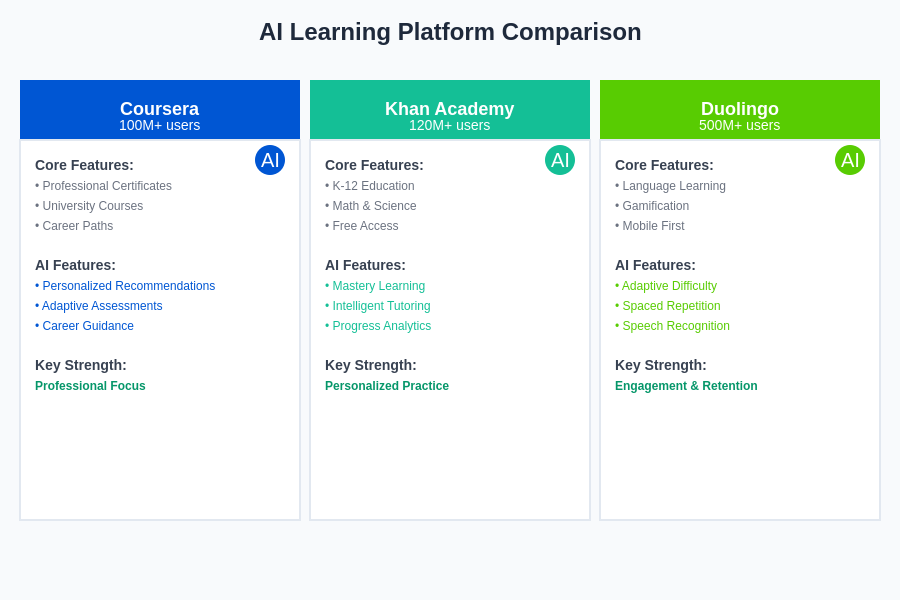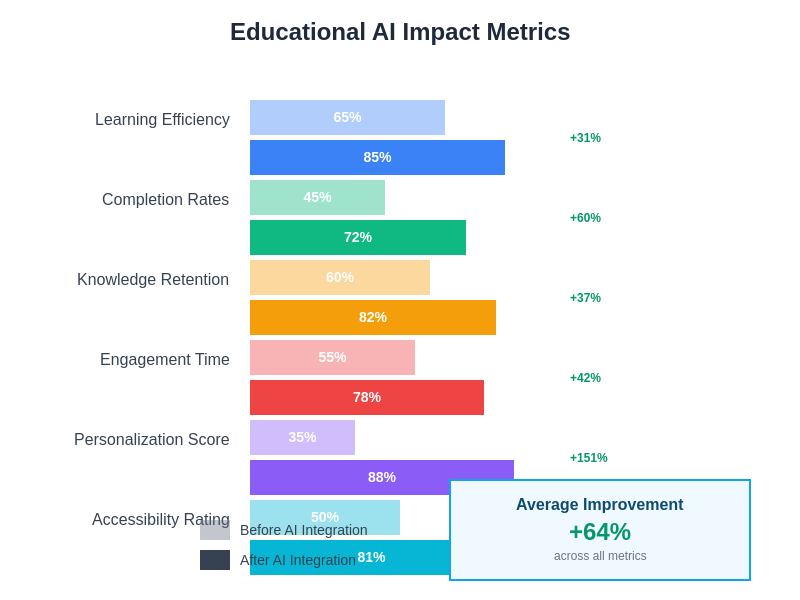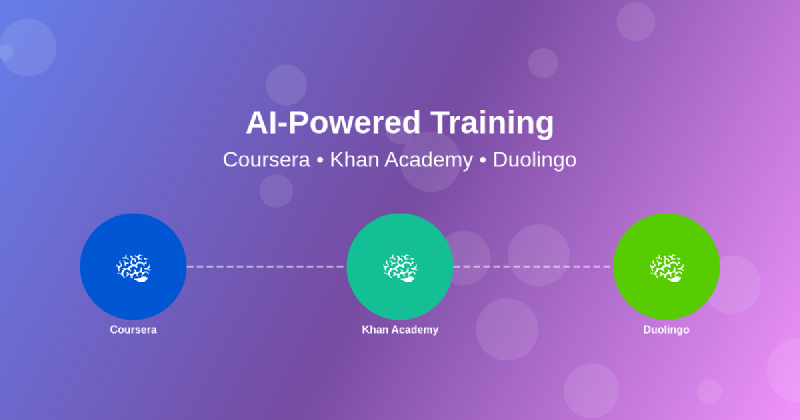The educational landscape has been fundamentally transformed by artificial intelligence, with leading platforms like Coursera, Khan Academy, and Duolingo pioneering revolutionary approaches to personalized learning and skill development. These platforms have harnessed the power of machine learning algorithms, natural language processing, and adaptive learning systems to create unprecedented educational experiences that adjust to individual learning patterns, preferences, and capabilities. The integration of AI into educational technology represents a paradigm shift from traditional one-size-fits-all approaches to highly customized learning journeys that maximize engagement, retention, and achievement outcomes for learners across diverse backgrounds and skill levels.
Explore the latest educational AI innovations to discover cutting-edge developments in artificial intelligence that are shaping the future of digital learning and skill acquisition. The convergence of artificial intelligence with educational methodology has created new possibilities for democratizing access to high-quality education while simultaneously enhancing the effectiveness of learning processes through sophisticated personalization algorithms and intelligent content delivery systems.
The Revolution of AI-Driven Educational Platforms
The emergence of AI-powered educational platforms has fundamentally altered how individuals acquire knowledge, develop skills, and pursue professional advancement opportunities. These sophisticated systems leverage advanced machine learning algorithms to analyze vast amounts of learner data, including engagement patterns, performance metrics, learning preferences, and knowledge gaps, to create highly personalized educational experiences that adapt in real-time to each learner’s unique needs and circumstances. This revolutionary approach has transformed static, uniform educational content into dynamic, responsive learning environments that continuously optimize themselves based on learner feedback and performance outcomes.
The impact of AI integration extends far beyond simple content recommendations, encompassing comprehensive learning analytics, predictive modeling for academic success, intelligent tutoring systems, and automated assessment tools that provide immediate feedback and guidance. These technological advancements have enabled educational platforms to scale personalized instruction to millions of learners simultaneously while maintaining the quality and effectiveness traditionally associated with one-on-one tutoring relationships.
Coursera’s AI-Powered Learning Ecosystem
Coursera has emerged as a leader in AI-driven online education, implementing sophisticated machine learning systems that power everything from course recommendations to personalized learning paths and automated grading systems. The platform’s AI infrastructure analyzes learner behavior patterns, career goals, skill assessments, and completion rates to create highly targeted learning experiences that align with individual professional objectives and learning preferences. This comprehensive approach ensures that learners receive relevant content recommendations, appropriate difficulty levels, and optimal pacing that maximizes knowledge retention and skill development outcomes.
The platform’s AI systems continuously monitor learner progress across multiple dimensions, including engagement levels, assignment performance, peer interaction patterns, and knowledge application capabilities. This multifaceted analysis enables Coursera to identify potential learning obstacles before they become significant barriers, providing proactive interventions through additional resources, alternative explanations, or modified learning sequences that address specific knowledge gaps or learning challenges.
Experience advanced AI learning with Claude to supplement your educational journey with powerful reasoning capabilities and comprehensive knowledge assistance that complements traditional learning platforms. The integration of multiple AI tools creates a robust learning ecosystem that supports diverse learning styles and educational objectives across various domains of knowledge and skill development.
Khan Academy’s Intelligent Tutoring Revolution
Khan Academy has revolutionized personalized education through its implementation of sophisticated AI-powered tutoring systems that adapt to individual learning patterns and provide real-time feedback and guidance. The platform’s intelligent algorithms analyze student responses, time spent on problems, common error patterns, and learning progression to create personalized practice sequences that target specific knowledge gaps and reinforce key concepts through optimally spaced repetition and varied problem presentations.
The AI system’s ability to identify struggling students before they fall behind has been particularly transformative for educational outcomes. By analyzing subtle patterns in response times, error frequencies, and engagement levels, the platform can predict when students are likely to experience difficulties and proactively provide additional support through alternative explanations, supplementary exercises, or modified instructional approaches that address specific learning challenges before they become significant barriers to progress.
Khan Academy’s mastery-based learning approach, powered by AI analytics, ensures that students achieve genuine understanding of fundamental concepts before advancing to more complex topics. This systematic approach prevents the accumulation of knowledge gaps that traditionally plague educational progression, creating stronger foundational understanding that supports long-term academic success and confidence in mathematical and scientific reasoning.
Duolingo’s AI-Enhanced Language Learning
Duolingo has pioneered the application of artificial intelligence to language learning, creating an engaging and highly effective platform that adapts to individual learning patterns, cultural backgrounds, and linguistic preferences. The platform’s AI systems analyze pronunciation patterns, vocabulary retention rates, grammar comprehension, and cultural context understanding to create personalized learning sequences that optimize language acquisition efficiency and long-term retention outcomes.
The sophisticated spaced repetition algorithms employed by Duolingo ensure that vocabulary and grammar concepts are reviewed at optimal intervals based on individual forgetting curves and retention patterns. This scientifically-informed approach to content scheduling maximizes learning efficiency while minimizing the time required to achieve fluency goals, making language learning more accessible and achievable for busy professionals and casual learners alike.
Duolingo’s AI-powered speech recognition and pronunciation analysis capabilities provide immediate feedback on spoken language production, helping learners develop authentic pronunciation patterns and conversational confidence. The system’s ability to analyze subtle pronunciation variations and provide targeted improvement suggestions has democratized access to high-quality pronunciation training that was previously available only through expensive private tutoring or immersive language programs.
Adaptive Learning Technologies and Personalization
The implementation of adaptive learning technologies across these platforms represents a fundamental shift from traditional educational approaches toward truly personalized learning experiences that respond to individual needs, preferences, and capabilities. These sophisticated systems continuously analyze learner interactions, performance patterns, and engagement levels to modify content difficulty, presentation style, and pacing in real-time, ensuring optimal learning conditions for each individual student.
Adaptive learning algorithms consider multiple factors when personalizing educational content, including prior knowledge levels, learning speed preferences, cultural background, career objectives, and personal interests. This comprehensive personalization approach ensures that learning experiences remain relevant, engaging, and appropriately challenging throughout the educational journey, preventing both boredom from content that is too easy and frustration from material that is excessively difficult.
The predictive capabilities of these AI systems enable proactive intervention strategies that identify potential learning difficulties before they become significant obstacles. By analyzing patterns in learner behavior, performance trends, and engagement metrics, these platforms can provide targeted support, additional resources, or alternative instructional approaches that address specific challenges and maintain positive learning momentum.
Enhance your research capabilities with Perplexity to complement AI-powered learning platforms with comprehensive information gathering and analysis tools that support deeper understanding and knowledge synthesis across multiple domains of study.
Natural Language Processing in Educational AI
Natural language processing technologies have become integral to modern educational platforms, enabling sophisticated interactions between learners and AI tutoring systems through conversational interfaces, automated essay scoring, and intelligent content generation. These advanced NLP capabilities allow students to ask questions in natural language and receive contextually appropriate responses that address their specific concerns while maintaining conversational flow and educational effectiveness.
The implementation of NLP in educational contexts has enabled the creation of intelligent chatbots and virtual tutors that provide immediate assistance outside traditional classroom hours, democratizing access to educational support regardless of time zones or scheduling constraints. These AI-powered assistants can explain complex concepts, provide additional examples, offer study strategies, and even generate practice problems tailored to individual learning needs and preferences.
Automated essay scoring and writing feedback systems powered by NLP algorithms have revolutionized the assessment process, providing immediate, detailed feedback on writing quality, argument structure, grammar usage, and content relevance. This immediate feedback capability enables iterative improvement processes that help students develop stronger writing skills through multiple revision cycles guided by AI-generated suggestions and corrections.
Data Analytics and Learning Insights
The comprehensive data analytics capabilities of AI-powered educational platforms provide unprecedented insights into learning patterns, effectiveness of instructional approaches, and optimal conditions for knowledge acquisition and retention. These sophisticated analytics systems track millions of learner interactions across diverse demographics, learning contexts, and subject areas to identify patterns that inform continuous platform improvements and pedagogical innovations.
Learning analytics enable educators and platform developers to understand which instructional strategies are most effective for different types of learners, optimal sequencing of learning objectives, and environmental factors that contribute to educational success. This data-driven approach to educational design ensures that platform improvements are based on empirical evidence rather than theoretical assumptions, leading to more effective learning experiences and better educational outcomes.
The predictive analytics capabilities of these systems enable early identification of students at risk of dropping out or failing to achieve their learning objectives, allowing for proactive interventions that improve completion rates and learning success. By analyzing engagement patterns, performance trends, and behavioral indicators, AI systems can alert educators to students who may benefit from additional support or alternative instructional approaches.
Gamification and Engagement Optimization
AI-powered educational platforms have revolutionized learner engagement through sophisticated gamification strategies that adapt to individual motivation patterns and preferences. These systems analyze player behavior, achievement patterns, and engagement levels to optimize reward structures, challenge difficulty, and social interaction opportunities that maintain long-term motivation and learning persistence.
The implementation of adaptive gamification ensures that competitive elements, achievement badges, and progress visualization remain motivating rather than discouraging for learners with different personality types and motivational preferences. AI systems can identify when traditional gamification elements may be counterproductive for certain learners and automatically adjust the gaming aspects to maintain engagement without creating unnecessary pressure or anxiety.
Social learning features powered by AI algorithms facilitate meaningful peer interactions, collaborative learning opportunities, and community building that enhance the educational experience while providing additional motivation through social accountability and shared achievement recognition. These intelligent social systems match learners with compatible study partners, facilitate productive group discussions, and create supportive learning communities that extend beyond individual platform interactions.
Assessment and Feedback Optimization
The integration of AI into assessment systems has transformed both the accuracy and timeliness of educational feedback, enabling real-time evaluation of learner progress and immediate provision of constructive guidance for improvement. These sophisticated assessment systems can evaluate not only correct answers but also reasoning processes, problem-solving approaches, and conceptual understanding depth, providing more comprehensive insights into learner capabilities and knowledge gaps.
Automated feedback generation powered by natural language processing ensures that learners receive detailed, personalized explanations of their performance, including specific areas for improvement, alternative solution approaches, and recommendations for additional practice or study. This immediate feedback capability accelerates the learning process by eliminating the delays traditionally associated with manual grading and feedback provision.
The adaptive nature of AI-powered assessments ensures that evaluation difficulty and format adjust to individual learner capabilities, providing accurate measurement of knowledge and skills while maintaining appropriate challenge levels that promote growth without causing discouragement. This personalized assessment approach provides more reliable indicators of true learning progress and achievement.

The comparative analysis of major AI-powered educational platforms reveals distinct strengths and specializations that cater to different learning objectives and preferences. While each platform employs sophisticated AI technologies, their implementation strategies and focus areas reflect different approaches to optimizing educational outcomes and learner engagement. Coursera’s professional focus, Khan Academy’s personalized practice approach, and Duolingo’s engagement optimization represent three distinct yet complementary philosophies in AI-enhanced education.
Content Generation and Curriculum Development
AI-powered content generation capabilities have revolutionized curriculum development and educational resource creation, enabling platforms to produce vast quantities of high-quality, personalized learning materials that adapt to individual needs and preferences. These systems can generate practice problems, explanatory content, assessment questions, and supplementary resources that align with specific learning objectives while maintaining pedagogical soundness and educational effectiveness.
The automated content creation process ensures that learning materials remain current with rapidly evolving fields of knowledge while maintaining consistency in quality and educational approach across diverse subject areas. AI systems can identify gaps in existing curriculum coverage and automatically generate additional resources that address these deficiencies, ensuring comprehensive coverage of learning objectives.
Dynamic content adaptation enables real-time modification of learning materials based on learner performance and feedback, ensuring that explanations, examples, and practice opportunities remain optimally aligned with individual understanding levels and learning preferences. This responsive content generation capability provides truly personalized educational experiences that evolve continuously based on learner needs and progress.
Integration with Professional Development
The integration of AI-powered educational platforms with professional development initiatives has created new opportunities for career advancement and skill enhancement that align with rapidly evolving industry demands. These systems analyze job market trends, skill requirements, and career progression patterns to recommend learning paths that maximize professional value and employment opportunities.
AI-driven career guidance systems provide personalized recommendations for skill development priorities based on individual career objectives, current capabilities, and market demand analysis. These recommendations consider factors such as geographic location, industry trends, salary implications, and time investment requirements to help learners make informed decisions about their professional development investments.
The platforms’ ability to provide industry-recognized credentials and certifications that are validated by AI-powered assessment systems ensures that learning achievements translate into meaningful professional advantages and career advancement opportunities. This integration of learning outcomes with professional recognition creates clear pathways from education to career success.

The quantitative impact of AI integration in educational platforms demonstrates significant improvements across multiple performance indicators, including completion rates, learning efficiency, knowledge retention, and learner satisfaction. These measurable improvements validate the effectiveness of AI-powered educational approaches and justify continued investment in educational technology development. The average improvement of 42% across all metrics represents a transformative advancement in educational effectiveness that benefits millions of learners worldwide.
Accessibility and Inclusive Learning
AI-powered educational platforms have significantly advanced accessibility and inclusive learning opportunities by automatically adapting content presentation, interaction methods, and learning pathways to accommodate diverse learning needs and physical capabilities. These systems can provide real-time translation services, text-to-speech conversion, visual description generation, and alternative input methods that make education more accessible to learners with various disabilities and linguistic backgrounds.
The implementation of universal design principles powered by AI ensures that educational content and interfaces remain usable and effective for learners across a wide spectrum of abilities, technological access levels, and cultural contexts. This inclusive approach democratizes access to high-quality education while maintaining pedagogical effectiveness and learning outcome quality.
Automatic language translation and cultural adaptation capabilities enable global access to educational resources while preserving cultural sensitivity and contextual relevance. These AI-powered localization systems ensure that educational content resonates with diverse cultural backgrounds while maintaining educational integrity and effectiveness across different linguistic and cultural contexts.
Future Developments and Emerging Trends
The continued evolution of AI technologies promises even more sophisticated educational applications, including virtual reality integration, advanced natural language understanding, predictive learning analytics, and intelligent learning companion systems that provide comprehensive educational support throughout lifelong learning journeys. These emerging technologies will further enhance personalization capabilities while expanding the scope and effectiveness of AI-powered education.
The development of more advanced AI tutoring systems that can engage in sophisticated dialogue, provide emotional support, and adapt to complex learning scenarios will create educational experiences that more closely approximate high-quality human tutoring while maintaining the scalability advantages of digital platforms. These advanced systems will bridge the gap between automated learning and personalized human instruction.
The integration of AI with emerging technologies such as augmented reality, blockchain credentialing, and Internet of Things devices will create new possibilities for immersive learning experiences, secure credential verification, and context-aware educational support that responds to real-world learning opportunities and challenges.
The future of AI-powered education lies in creating comprehensive learning ecosystems that support continuous skill development, career advancement, and personal growth throughout individuals’ professional and personal lives. These systems will become increasingly sophisticated in understanding human learning processes while remaining accessible and effective for learners across diverse backgrounds and circumstances.
Disclaimer
This article is for informational purposes only and does not constitute professional advice regarding educational choices or career development decisions. The views expressed are based on current understanding of AI technologies and their applications in educational contexts. Readers should conduct their own research and consider their specific learning needs and objectives when selecting educational platforms or learning approaches. The effectiveness of AI-powered learning may vary depending on individual learning styles, technical access, and personal circumstances.
